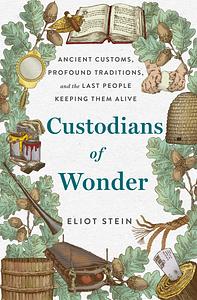Take a photo of a barcode or cover
241 reviews for:
Custodians of Wonder: Ancient Customs, Profound Traditions, and the Last People Keeping Them Alive
Eliot Stein
241 reviews for:
Custodians of Wonder: Ancient Customs, Profound Traditions, and the Last People Keeping Them Alive
Eliot Stein
adventurous
informative
slow-paced
This is a travelogue based on Mr. Stein's adventures in traveling to meet people who are the 'last of their kind', that is the last person with ancient knowledge and skills passed on for hundreds of years. I found the topic interesting, but the book read to much like a memoir of a traveler with long chunks of history thrown in. If you enjoy reading about peoples travels and history, this will be right up your alley. Thank you to NetGalley for an advanced copy in return for my honest opinion.
hopeful
informative
reflective
slow-paced
Stein profiles people with rare or disappearing jobs from around the world and uses that as a springboard to talk about the surrounding history of the job and the area, but also talks a little bit about himself. I found the memoir aspects less compelling — I wanted to hear more about these interesting people with interesting jobs. Some profiles succeed more than others, but overall, I liked this. I particularly recommend the chapter on los lectores in Cuba (people who read news and novels to cigar rollers during their shifts), and the chapter on the "romantic" oak tree in Germany that ended up profoundly affecting the postal worker assigned to deliver letters there. Both of these chapters appeared in a previous form on BBC Travel, so I wonder if having extra time to percolate helped. Even if, overall, this wasn't love for me, ymmv.
Minor: Colonisation
adventurous
hopeful
relaxing
medium-paced
Within seconds - seriously, seconds - of finishing this book, I had Google pulled up to learn more about several of the stories told here. You will want to do the same.
Eliot Stein's Custodians of Wonder provides a look at ten international, historical traditions and customs, and those who keep them alive - the custodians. The structure of his narrative is not easily classified, which is part of what makes this book so special. It's part-memoir, part-history, part-anthropology, and part-biography. Stein was able to weave together the elements of each story in such a way that transcends a typical recount. After the first chapter, I really took my time with this book, because it was so clear from the start that each chapter deserves one's full attention and curiosity.
When writing about cultures so far removed from your own, it can be a long, complicated dance of trying to figure out what information to include, what to leave out, and, perhaps most important, the tone to take in your prose. Each chapter has the same structure: an introduction to the primary custodian and their tradition, a substantial history of the region & importance of the respective tradition, Stein's experience engaging with and learning of the tradition, and some closing remarks about the fleeting future of the tradition and its cultural implications. I swear, as I was reading this book, I would think to myself "So.. what about this? Why this?" Not long after, most of the questions I had were explored. Though this is the first work by Stein that I've read (he's a journalist at BBC), it is very clear to me that he's an experienced cultural journalist, and I could tell that he put serious work into what exactly to include in each chapter.
One of the aspects of this book that I loved most was the absolute delicacy and grace that Stein assigned to each custodian, culture, and tradition. There's a lot to be learned from this book - not just about a specific, special tree in Germany, Sardinia's most prized dish, or the last night watchman in Scandinavia, but also what it means to put home and history above yourself. In an age where so many of us are possessed by the individual (ourselves), it can be difficult to imagine a life where we put a collective past and practice above our own interests. The introduction to this book, which I returned to several times while reading, did a brilliant job of contextualizing each tradition within the global stage at large, but even more so, reminded us why such traditions are so important to our present human experience and have been for centuries. It was humbling and it was grounding.
My criticisms of this book are minor. While the introduction was fantastic, I would have liked to learn more of Stein's methods when it came to researching this book - the travel, the language barriers, any difficulties, etc. While each chapter includes some anecdotes about his time travelling to each place, I wish we got to learn more of the steps that got us to this book. Additionally, I think a conclusion would have served the book well; however, I can imagine that a lot of what was written in the introduction would also show up in a conclusion. Also, I wish some photos and maps were included. Since I read an ARC of this book, the publisher may be saving images for the final printed edition, but I am not sure. Regardless, taking the extra step to Google wasn't too bad at all.
Overall, I would recommend this book to anyone who is naturally curious and wants to learn more about cultures different than their own. I think a lot of us read both fiction and non-fiction to escape our own turbulent times, and this is a perfect book to do so. While Stein does not shy away from some of the negative prospects in each story, the tone of this book is positive, encompassing, and very compelling. Reading this was one of the best experiences this year.
Thank you very much to St. Martin's Press for the ARC of this book! All opinions are my own.
Eliot Stein's Custodians of Wonder provides a look at ten international, historical traditions and customs, and those who keep them alive - the custodians. The structure of his narrative is not easily classified, which is part of what makes this book so special. It's part-memoir, part-history, part-anthropology, and part-biography. Stein was able to weave together the elements of each story in such a way that transcends a typical recount. After the first chapter, I really took my time with this book, because it was so clear from the start that each chapter deserves one's full attention and curiosity.
When writing about cultures so far removed from your own, it can be a long, complicated dance of trying to figure out what information to include, what to leave out, and, perhaps most important, the tone to take in your prose. Each chapter has the same structure: an introduction to the primary custodian and their tradition, a substantial history of the region & importance of the respective tradition, Stein's experience engaging with and learning of the tradition, and some closing remarks about the fleeting future of the tradition and its cultural implications. I swear, as I was reading this book, I would think to myself "So.. what about this? Why this?" Not long after, most of the questions I had were explored. Though this is the first work by Stein that I've read (he's a journalist at BBC), it is very clear to me that he's an experienced cultural journalist, and I could tell that he put serious work into what exactly to include in each chapter.
One of the aspects of this book that I loved most was the absolute delicacy and grace that Stein assigned to each custodian, culture, and tradition. There's a lot to be learned from this book - not just about a specific, special tree in Germany, Sardinia's most prized dish, or the last night watchman in Scandinavia, but also what it means to put home and history above yourself. In an age where so many of us are possessed by the individual (ourselves), it can be difficult to imagine a life where we put a collective past and practice above our own interests. The introduction to this book, which I returned to several times while reading, did a brilliant job of contextualizing each tradition within the global stage at large, but even more so, reminded us why such traditions are so important to our present human experience and have been for centuries. It was humbling and it was grounding.
My criticisms of this book are minor. While the introduction was fantastic, I would have liked to learn more of Stein's methods when it came to researching this book - the travel, the language barriers, any difficulties, etc. While each chapter includes some anecdotes about his time travelling to each place, I wish we got to learn more of the steps that got us to this book. Additionally, I think a conclusion would have served the book well; however, I can imagine that a lot of what was written in the introduction would also show up in a conclusion. Also, I wish some photos and maps were included. Since I read an ARC of this book, the publisher may be saving images for the final printed edition, but I am not sure. Regardless, taking the extra step to Google wasn't too bad at all.
Overall, I would recommend this book to anyone who is naturally curious and wants to learn more about cultures different than their own. I think a lot of us read both fiction and non-fiction to escape our own turbulent times, and this is a perfect book to do so. While Stein does not shy away from some of the negative prospects in each story, the tone of this book is positive, encompassing, and very compelling. Reading this was one of the best experiences this year.
Thank you very much to St. Martin's Press for the ARC of this book! All opinions are my own.
I liked that this book actually looked and found more offbeat individuals to interview and learn from than most books of this style. There are some very unique jobs in the world and you'll learn about some of them in here. I think this book could provide a number of possibilities for people writing fantasy novels to jump off from.
I received this book in exchange for a review, but all opinions are my own.
I received this book in exchange for a review, but all opinions are my own.
Not bad, I’m just finding it very dry and boring right now :/
This was a fantastic read! I loved every single chapter, and found something new and interesting on pretty much every page. I can't wait to have a physical copy of this book to re-read and pull out more of my favorite passages. This book is ideal for anyone who is interested in things that are almost lost and want inspiration for their own lives in a way that surprises you.
informative
inspiring
reflective
sad
For armchair traveling, this was a delight -- visiting locations where a longtime custom is in danger of disappearing, and getting to know the last practitioners. The variety was wide, from rope-bridge builders in the Andes to movie sign painters in Taiwan, from a matchmaking tree in Germany to the fungus and bacteria that produce real soy sauce in Japan (I want to taste this before it disappears). Though often focused on an individual with particular endangered skills, each story was also about a community, and about the history of a people and a place. It is sad that such customs may go the way of the dinosaurs, but humanity will evolve new ones. It is our nature to create and to form living networks of meaning, even if that is currently obscured under a barrage of technology. It will rise again, because it is what makes us human. And reminding us of that fact was the underlying gift of this book.
adventurous
informative
relaxing
medium-paced
I received an ARC of this book from Netgalley and the publisher in exchange for my honest review.
“So often, we hear stories about the first person to do something: the innovators, the pioneers, the ones who move us forward. But rarely is there a whisper for the last person to carry on a tradition, or a pause to look back and consider how these rites have shaped us and the places we come from”
“So often, we hear stories about the first person to do something: the innovators, the pioneers, the ones who move us forward. But rarely is there a whisper for the last person to carry on a tradition, or a pause to look back and consider how these rites have shaped us and the places we come from”
The introduction of this book really sets the tone for the rest of the book and what was to come. What a unique perspective to hear these voices and stories, often looked over by our constant need to move forward and innovate and forget our past. It reminds me of animal extinctions, how we only appreciate some animals when they’re gone.
If you enjoy learning about various topics told from unique perspectives, you will enjoy this book. If you enjoy traveling and learning about what may otherwise be passed over and are a curious wonderer, you will enjoy. This book is something I slowly went through, and it is not a book you want to rush through. Some of the stories shared were more interesting than others to me personally but it did not detract from the book overall, and I think most will be able to find a few that resonate with them.
Stein's book offers a captivating escape into the realms of real-life tales, weaving a tapestry of captivating narratives drawn from his travels. With a seamless blend of whimsy and depth, he breathes life into legends of old, inviting readers on a journey that is both entertaining and thought-provoking. Stein's storytelling prowess shines through, effortlessly captivating the reader with his easy-to-follow style and gripping anecdotes. Each page leaves you craving more, making it a book worthy of multiple reads. Particularly memorable are the enchanting stories of pasta and soy sauce, adding flavor to an already delightful narrative. In fact, this book is so engrossing, it could easily transition into a captivating documentary. A must-read for anyone seeking adventure and inspiration between the pages.








